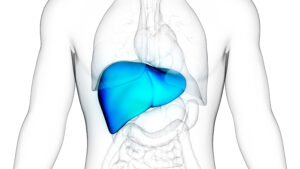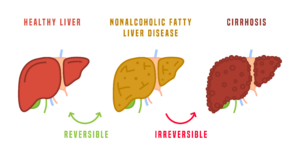PROTECT, DETOXIFY, AND REPAIR THE LIVER
Liver damage can occur for many reasons: infectious diseases such as hepatitis, the use of certain over-the-counter and prescription drugs, accidental poisoning, environmental toxins and stress, alcohol abuse, and even poor diets.
But three botanicals–milk thistle, andrographis, and grape seed extract–can prevent and reverse liver damage and support your patients in remarkable ways:
- Protect against liver damage
- Detoxify and restore liver function
- Enhance nutrient absorption and normalize blood sugar
Optimal Health Begins with the Liver
Unless they have been diagnosed with a liver condition or considering a detoxification regimen, your patients may not think about their liver very much. But that could be a potentially harmful oversight. The liver is one of the body’s hardest-working organs, and your patients’ well-being depends on it working at its best, every day.
When the liver is healthy, it can effectively counter numerous threats, including poor diets, environmental toxins, overconsumption of alcohol, and the use of common over-the-counter drugs. But over time, those challenges can add up, so your patients may need a nutrient protocol to restore liver strength and prevent issues from cropping up. Fortunately, three botanicals–milk thistle, andrographis, and grape seed extract–are up to the task.
Protect Liver from Damage
For restoring the liver and improving its function, milk thistle (Silybum marianum) is one of the most highly regarded and best-known botanicals. It has multiple studies that verify its use and is considered a ‘go-to’ herb for virtually any liver-related issue.
One of milk thistle’s key compounds, silybin, has been shown to stop oxidative damage by preventing the formation of free radicals and inhibiting fibrosis, an accumulation of scar tissue in the liver that can ultimately result in liver failure. Silybin turns off pro-inflammatory signals and chelates iron, saving the liver from other potential inflammation and oxidation cascades.
Additionally, silybin doesn’t interact negatively with other drugs or cause unwanted side effects, making milk thistle easily incorporated into a daily regimen.
Andrographis (Andrographis paniculata) has been used in Ayurvedic practice for thousands of years and is especially valued for its role in supporting the liver. Andrographis boosts the activity of some of the most powerful antioxidants generated by the body—glutathione and superoxide dismutase. It also increases the activity of a protein called Nrf2, which reduces cellular degradation and premature aging of tissue throughout the body.
While andrographolide is the most studied compound from andrographis, it is important to get the full complement of compounds for the best liver protection. That’s why an extract standardized for a concentration of andrographolide, but one that retains other components of the herb, may be best in a liver-restoring protocol.
One of the ways of measuring liver damage is by taking note of the levels of an enzyme called alanine aminotransferase. When the liver is functioning properly, levels are low. When it is diseased, they can rise dramatically.
Interestingly, grape (Vitis vinifera) seed extract, while well known for heart health, also protects cells from oxidative damage in the liver, and shows great promise for people suffering from non-alcoholic fatty liver disease (NAFLD), as demonstrated in a recent clinical study.
Individuals treated with grape seed extract saw significant changes in just three months. This botanical reduced the accumulation of fat deposits in the liver, stopped oxidative damage, and significantly lowered levels of alanine aminotransferase.
The antioxidant power of grape seed extract may also help those undergoing radiation treatment. Because the liver reacts so poorly to radiation treatment, (whether or not the liver or another part of the body is a target of the therapy), it suffers damage that becomes a serious secondary concern. Fortunately, scientific research has found that grape seed extract protects liver cellular membranes from radiation induced damage, restores natural antioxidant levels, and reduces protein and lipid oxidation.
There is much variability in the quality of grape seed extracts, so for the best results in a liver-restoring protocol, it pays to be selective. Not all of them will absorb properly because their oligomeric proanthocyanidins are bound up with tannins, which have a large molecular size and are not readily assimilated during digestion. Instead, consider a grape seed extract that has been used in leading scientific studies and is tannin free with small, easily absorbed OPCs that can actually deliver the liver protection your patients need.
Promote Detoxification and Restore Liver Function
Silybin from milk thistle inhibits beta-glucuronidase, an enzyme that would otherwise loosen the binding between glucuronic acid and toxins circulating in the body, and ensures they are safely excreted during digestion.
Some of the most famous cases of milk thistle’s effectiveness have been its life-saving effects in detoxifying the poison of the Death Cap mushroom (Amanita phalloides). When these mushrooms are accidentally consumed, the mortality rate is about 30 percent. However, in laboratory studies when milk thistle is administered quickly (up to 10 minutes after ingestion), the survival rate is 100 percent. Other laboratory research has shown that milk thistle protects against death from toxicity and long-term liver damage within a full 24 hours after poisoning.
Even more impressively, silybin saves lives even three days after initial poisoning. In one instance, an Italian family was admitted three days following the accidental ingestion of Amanita mushrooms. Initial conventional therapy didn’t improve the intensive liver damage, and only after intravenous administration of silybin did they recover.

The liver is one of the body’s hardest working organs, and your patients’ well-being depends on it working at its best, every day. But over time, poor diets, environmental toxins, consumption of alcohol, and over-the-counter drugs can add up, so your patients may need a nutrient protocol to restore liver strength.
In cases of hepatitis C, a clinical study found that milk thistle improved a number of parameters in patients infected with the virus. At the end of the six-month study, the researchers found that milk thistle reduced levels of harmful liver enzyme activity, inhibited markers of liver fibrosis, and greatly improved the patients’ quality of life.
Overall, milk thistle protects against toxins and pesticides that induce liver fibrosis or dysfunction, reduces marker enzymes associated with liver damage, restores antioxidant enzymes, and inhibits cell-damaging lipid peroxidation – in some cases by as much as 48 percent.
Grape seed extract has been shown in scientific research to protect against lead-induced liver injury by working through the peroxisome proliferator-activated receptor alpha (PPARα) pathway and improving the way the liver detoxifies lead-saturated fatty acids.
Enhance Nutrient Metabolism and Normalize Blood Sugar
The liver processes almost everything we eat and drink, filters toxins and alcohol from our blood, and synthesizes the lipids that create the hormones the body needs. But when the liver is damaged, it can’t perform these functions properly. And that can lead to a variety of other issues, including how well an individual metabolizes nutrients and how the body processes sugars and carbohydrates.
For example, a randomized, placebo-controlled clinical study of patients with type 2 diabetes found that milk thistle reduced high glucose and triglyceride levels and helped normalize A1C levels in four months.
Clinical and scientific studies have found that grape seed extract reduces postprandial (after eating) blood sugar levels after a high carbohydrate meal and alleviates the effects of a high fat diet that can lead to the accumulation of fat in the liver, a cause of fatty liver disease.
This action was due, in part, to an increase of adiponectin, a protein responsible for regulating blood sugar levels, insulin metabolism, cholesterol levels, and inhibiting the activation of NF-kB and other inflammatory markers. In one case, the adiponectin level of the grape seed group increased 61 percent compared to the control group.
Other scientific work has reported comparable results – that the use of grape seed extract protects against fat accumulation and improves blood triglyceride and plasma lipid levels.
Andrographis has been shown to reduce alanine aminotransferase activity, an enzyme associated with liver damage, while lowering cholesterol accumulation in the liver and inhibiting lesion development and tumor nuclear factor-a (TNF-a), an inflammatory marker. It also reduced hepatic lipid peroxides, caused by increased cytochrome P-450 activity, and a prime mover behind NAFLD as well.
Other scientific research has found that andrographis restores normal blood glucose levels and reduces insulin resistance, so it makes a good partner botanical to milk thistle.
Improve Liver Health and Overall Well-Being
The liver is unique among the body’s organs; even if 75 percent of the liver is damaged, it can reproduce new tissue from the remaining healthy cells. But sometimes that ability is not always helpful.
When a liver is chronically stressed, its own efforts at wound healing can cause fibrosis as the liver increases production of tissue to an unhealthy level. But this doesn’t have to be an inevitable outcome. Research published in the journal PLoS One shows that andrographolide from andrographis can stop the over-proliferation of cells that can lead to cirrhosis.

Given time, lifestyle choices, and the right nutrients, the liver has remarkable abilities to heal itself. But there are tipping points beyond which even the most well-planned protocols simply can’t fix. Like any health condition, addressing liver concerns sooner rather than later yields stronger results.
Other Reasons to Recommend Milk Thistle, Andrographis, and Grape Seed Extract
Aside from preserving the liver, research at the University of Colorado has explored milk thistle’s ability to protect against skin and lung cancer. In the case of skin cancer, it protects against UV damage and kills potential skin cancer cells that develop as a result of UV damage.
In lung cancer, this same compound blocks the activation of inflammatory enzymes (including COX-2) that would otherwise lead to tumor growth. In one case, researchers concluded that it may be “as effective as today’s best treatments.” Other research shows that milk thistle can protect the liver against the toxicity of chemotherapy – while not interfering with the effectiveness of the cancer treatment.
One review reported that andrographolide, a key compound from andrographis, stopped tumor replication in virtually every type of cancer cell line tested and addressed nearly every mechanism, including inflammation, oxidation, cell replication, and cancer cell invasion. The botanical compound’s efficacy against tumors impressed the researchers so much that they concluded, “After careful consideration of the relevant evidence, we suggest that andrographolide can be one of the potential agents in the treatment of cancer in the near future.”
Grape seed extract may also one day help those undergoing radiation treatment, which frequently causes unintentional liver damage. Fortunately, research has found that grape seed extract protects liver cellular membranes from radiation-induced damage and restores natural antioxidant levels.
And, for patients dealing with colorectal cancer, the third most common cancer worldwide, andrographis and grape seed extract may act as an adjunct treatment. Because patients frequently develop resistance to chemotherapy, researchers wanted to see if these botanicals could help. They conducted a scientific study using colorectal cancer cells and treating them with a specific combination of andrographis (EP80), and a French grape seed extract (VX1). They found these extracts reduced tumor size, killed cancer cells, and prevented future tumors from developing. So, like milk thistle, they could make conventional chemotherapy more effective at lower doses, and as a result, less dangerous for patients undergoing treatment.
Help Your Liver – and Your Health Thrive
The liver needs the right nutrients to function properly and recommending them can make a critical improvement in your patients’ health. While restoring liver function is often a challenge and a long-term prospect, the powerful detoxifying and liver-restoring power of milk thistle, andrographis, and tannin-free French grape seed extract, can help stop and reverse liver damage to help your patients live a longer, healthier life.


